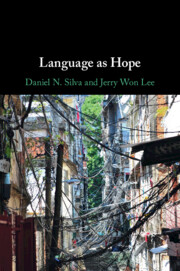Acknowledgments
As we finish our book on hope, it would seem appropriate to properly acknowledge those who have supported us, who have shown hope in us and our project. It is going to be impossible to name every single individual and organization, but we will do our best.
It is important that we first acknowledge our colleagues from the various grassroots activist organizations in Brazil, including Instituto Raízes em Movimento, Instituto Marielle Franco, and Coletivo Papo Reto. The dialogue with activists from Instituto Raízes em Movimento was fundamental to this project, and we want to thank Alan Brum Pinheiro, Raphael Calazans, David Amen, Nathalia Menezes, Ricardo Moura, and all other colleagues from Raízes who have been enthusiastic in sharing their perspective on a number of theoretical and political issues with us. The work of the members of Instituto Marielle Franco and Coletivo Papo Reto has been an important source of inspiration and critical reflection for this book, and we want to especially thank Anielle Franco and Thainã Medeiros for welcoming our project. We are also thankful to Mariluce Mariá and Kleber Souza for their enthusiasm in teaching us about digital activism and the fractalization of hope. Finally, we are thankful to our interlocutors who remain anonymous but whose contributions have been invaluable, nonetheless.
Our editor at Cambridge University Press, Becky Taylor, showed much support for this project when we first proposed it to her, and provided much needed input along the way. It has also been a great experience working with Izzie Collins.
We also wish to express gratitude to our mutual friend, Sylvia Nam, who was kind enough to introduce us back in 2014 when Daniel was visiting Irvine. We could not have predicted how close friends and collaborators we would become over the years.
The ideas presented in this book benefited from critical conversations with numerous friends and colleagues along the way, including Claudiana Alencar, Ana Cecília Bizon, Rodrigo Borba, Charles Briggs, Suresh Canagarajah, Alan Carneiro, Leticia Cesarino, Constadina Charalambous, José M. Cortez, Bruno Coutinho, Ana Deumert, Sender Dovchin, Allison Dziuba, Branca Fabrício, Adriana Facina, Ricardo Gaiotto, Pedro Garcez, Diego Galeano, Eric House, Marco Jacquemet, Samiha Khalil, Eleana Kim, Claire Kramsch, Julia Lee, Adriana Lopes, Letizia Mariani, Junot Maia, Xochitl Marsilli-Vargas, Tommaso Milani, Luiz Paulo Moita-Lopes, Lesliê Mulico, Daniela Palma, Pâmella Passos, Joana Plaza Pinto, Kanavillil Rajagopalan, Ben Rampton, Bruno Reinhardt, Lia Schulz, Inês Signorini, Antonio Carlos Souza de Lima, Serk-Bae Suh, Shaila Sultana, Ann Thuy-Ling Tran, Viviane Veras, Jonas Weaver, and Joel Windle.
We would also like to thank Monica Heller and Asif Agha for “sitting at the table” with us as editors of the Journal of Sociolinguistics and Signs and Society and discussing crucial dimensions of the sociolinguistic work of the Rio de Janeiro activists.
The UCI administrative staff, in particular DeeDee Nunez, helped us to navigate financial and bureaucratic labyrinths related to funding to support this project. Other UCI staff who deserve acknowledgment are Jasmine Diaz, Angeline Hernandez, Michelle Hu, Marcus Kanda, Elizabeth Pace, Kazumo Washizuka, and Stephanie Wijetilleke.
The UCI Humanities Center has supported this project through numerous grants over the years. We are grateful to Director Judy Wu and Executive Director Amanda Swain for their continued support. The publication of this book through Cambridge’s Gold Open Access was made possible by generous funding from UCI School of Humanities Dean’s Research Initiative. We therefore thank Dean Tyrus Miller for his faith in this work.
Our UCI colleagues Emily Dearborn and Sarah Sok offered their careful and critical eyes as we finalized the manuscript. Letizia Mariani read through nearly every single page of the manuscript and helped to improve the readability of the book considerably. And, of course, all remaining oversights are the responsibility of Daniel and Jerry only.
Writing any book requires ongoing support from friends and family. We thus want to especially thank Eduardo, Sei, and Hanjei for their love and understanding.
We write these words just one day after the 2022 presidential election in Brazil, where there is a bit more hope for a better tomorrow.
Permissions
This book incorporates substantially revised and reconceptualized material from some previous publications. Though substantial changes are evident, we nonetheless are grateful for the permissions to repurpose the material from the following sources: Silva, D. N., & Lee, J. W. (2021). “Marielle, presente”: Metaleptic temporality and the enregisterment of hope in Rio de Janeiro. Journal of Sociolinguistics, 25(2), 179–197. Wiley.
Khalil, S., Silva, D. N., & Lee, J. W. (2022). Languaging hope: The transgressive temporality of Marielle Franco in Brazil. In S. Makoni, A. Kaiper-Marquez, & L. Mokwena (Eds.), The Routledge handbook of language and the Global South/s (pp. 19–29). Routledge.
Silva, D. N. (2022). Papo Reto: The politics of enregisterment amid the crossfire in Rio de Janeiro. Signs and Society, 10(2), 239–264. University of Chicago Press for the Semiosis Research Center, Hankuk University of Foreign Studies.
